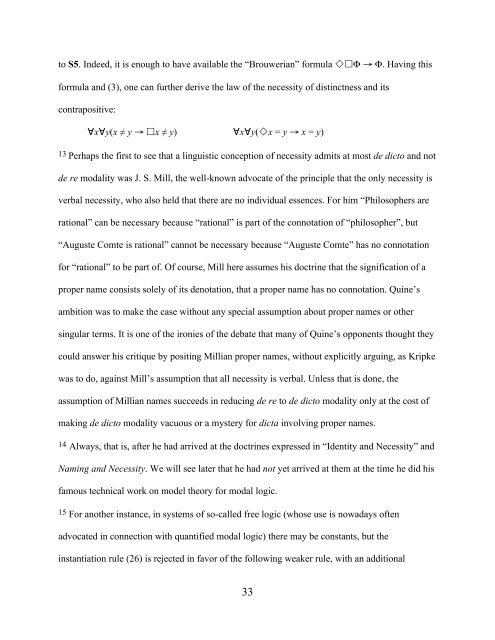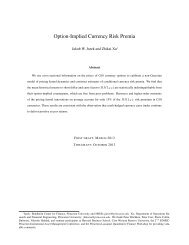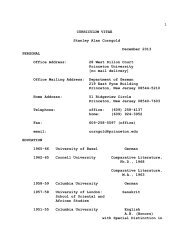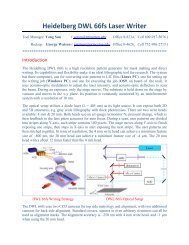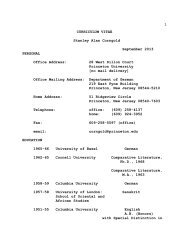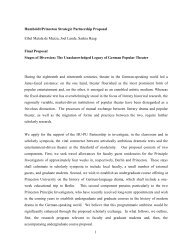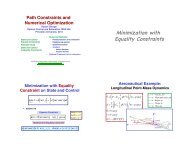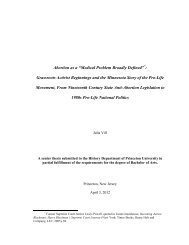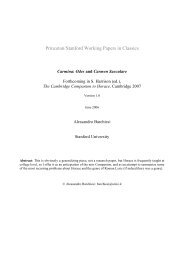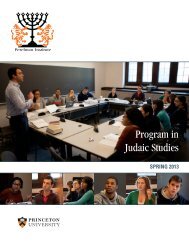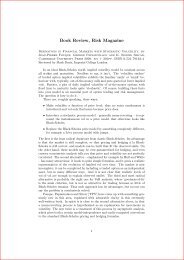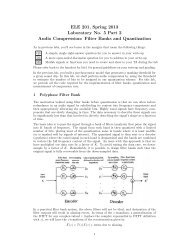On a Derivation of the Necessity of Identity - Princeton University
On a Derivation of the Necessity of Identity - Princeton University
On a Derivation of the Necessity of Identity - Princeton University
You also want an ePaper? Increase the reach of your titles
YUMPU automatically turns print PDFs into web optimized ePapers that Google loves.
to S5. Indeed, it is enough to have available <strong>the</strong> “Brouwerian” formula Φ → Φ. Having this<br />
formula and (3), one can fur<strong>the</strong>r derive <strong>the</strong> law <strong>of</strong> <strong>the</strong> necessity <strong>of</strong> distinctness and its<br />
contrapositive:<br />
∀x∀y(x ≠ y → x ≠ y) ∀x∀y(x = y → x = y)<br />
13 Perhaps <strong>the</strong> first to see that a linguistic conception <strong>of</strong> necessity admits at most de dicto and not<br />
de re modality was J. S. Mill, <strong>the</strong> well-known advocate <strong>of</strong> <strong>the</strong> principle that <strong>the</strong> only necessity is<br />
verbal necessity, who also held that <strong>the</strong>re are no individual essences. For him “Philosophers are<br />
rational” can be necessary because “rational” is part <strong>of</strong> <strong>the</strong> connotation <strong>of</strong> “philosopher”, but<br />
“Auguste Comte is rational” cannot be necessary because “Auguste Comte” has no connotation<br />
for “rational” to be part <strong>of</strong>. Of course, Mill here assumes his doctrine that <strong>the</strong> signification <strong>of</strong> a<br />
proper name consists solely <strong>of</strong> its denotation, that a proper name has no connotation. Quine’s<br />
ambition was to make <strong>the</strong> case without any special assumption about proper names or o<strong>the</strong>r<br />
singular terms. It is one <strong>of</strong> <strong>the</strong> ironies <strong>of</strong> <strong>the</strong> debate that many <strong>of</strong> Quine’s opponents thought <strong>the</strong>y<br />
could answer his critique by positing Millian proper names, without explicitly arguing, as Kripke<br />
was to do, against Mill’s assumption that all necessity is verbal. Unless that is done, <strong>the</strong><br />
assumption <strong>of</strong> Millian names succeeds in reducing de re to de dicto modality only at <strong>the</strong> cost <strong>of</strong><br />
making de dicto modality vacuous or a mystery for dicta involving proper names.<br />
14 Always, that is, after he had arrived at <strong>the</strong> doctrines expressed in “<strong>Identity</strong> and <strong>Necessity</strong>” and<br />
Naming and <strong>Necessity</strong>. We will see later that he had not yet arrived at <strong>the</strong>m at <strong>the</strong> time he did his<br />
famous technical work on model <strong>the</strong>ory for modal logic.<br />
15 For ano<strong>the</strong>r instance, in systems <strong>of</strong> so-called free logic (whose use is nowadays <strong>of</strong>ten<br />
advocated in connection with quantified modal logic) <strong>the</strong>re may be constants, but <strong>the</strong><br />
instantiation rule (26) is rejected in favor <strong>of</strong> <strong>the</strong> following weaker rule, with an additional<br />
33


